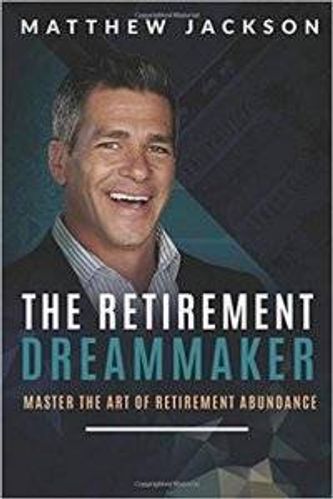5 Retirement Pitfalls You'll Want to Avoid
Advice from the author of 'The Retirement Dreammaker'
(The following article is adapted from The Retirement Dreammaker: Master the Art of Retirement Abundance by Matthew Jackson.)

I’ve interviewed more than 1,000 retirees over the years and have observed retirees defaulting to a retirement lifestyle lacking excitement, positive challenges, contribution in significant ways, personal growth, and, ultimately, fulfillment. Below are five retirement pitfalls I’ve witnessed. I believe that those who understand the circumstances, situations and events they may encounter in retirement have a better chance of avoiding the snags and of feeling fulfilled in the third chapter of their life.
Let’s unpack each, so you can identify whether you are experiencing any of these thought patterns, and start on a path to self-correction.
1. Lack Of Money
There are few things that frustrate me more professionally than watching good people get paralyzed by the feeling of not having enough. It’s easy to get caught up in the idea that we don’t have enough when other people’s abundance is constantly shoved in our face. Rather than looking inward for personal satisfaction and happiness, we are constantly and subconsciously told we must measure our happiness in terms of our possessions or the events that take place in our lives.
No matter how much money you believe you have or will make, if you are spending more than you are earning, you may very well find yourself with this retirement pitfall. Being content with where you are and living within your means is both empowering and freeing. Don’t be locked in a cage because of a lack of money.

2. Lack Of Permission
Feeling like you lack financial resources leads to the belief that you lack permission to follow your passions and live your life with confidence.
A couple recently came to my office feeling frustrated. They told me they had found their dream retirement home, a few miles from their current home. When they were done explaining the details of the property and all they could do with it, I told them I couldn’t wait to see it. That’s when the tone of the meeting changed. With a little embarrassment, humility and wonder in their voices, they told me they didn’t know if they could afford the extra cost of purchasing the property.
I watched their bodies and faces physically tighten as they explained their concerns. No one had given them the financial permission and the confidence they needed to believe they could live this retirement dream. We all experience these insecurities.
This couple had come to get my permission that their retirement plan could handle the extra expense of buying their dream property. As we ran the hypothetical stress test models, I could see that they would be able to handle it. I’ll never forget the day they came into my office to review the results. They walked in looking serious and sat very straight in the chairs. It was if a weight had been lifted from their shoulders. The tightness in their lips and chests disappeared instantly. My permission was met with a simultaneous sigh of relief and smiles on their faces.
I often wonder how many people don’t fully live a life true to their dreams because they haven’t heard a simple word of permission or encouragement to help them do so.
3. Isolation
I’m sure there have been times in your life, sitting at your work desk, that all you can think about is getting away from it all. It’s healthy to have a little isolation. Being isolated helps us to decompress, rejuvenate our physical and mental energy and to gain the mental clarity we need to solve problems we are experiencing. However, extended isolation with little social interaction has been well documented to increase the risk of cardiovascular problems, rheumatoid arthritis, osteoporosis, some forms of cancer, depression and memory loss.
Isolated individuals are up to 50 percent more likely to develop cognitive decline. They are less likely to exercise, eat right, and develop hobbies. Compared to people who have regular social interactions, isolated individuals are more likely to need long-term health care and to be victims of elder abuse.
Many retirees fall into isolation by no fault of their own. Here’s a list of circumstances to be aware of that can cause isolation.
- Financial changes in retirement
- Friends moving away
- Getting stuck in old daily habits
- Loss of optimism about the future
- Hearing loss
- Loss of mobility caused by health complications
- Grief resulting from loss of a spouse or close friend
- Physical and emotional pain
- Decreased sense of personal safety
- Problems with memory recall
I highly doubt that people ever anticipate how deeply isolation can affect their life in retirement. It’s my hope that your new awareness of the negative effects of isolation helps you to avoid it in any shape or form.
4. Waiting For Milestones
Milestones are the measuring stick we use to analyze our progress in life, compare ourselves to others and fit into the construct of the life we believe we should be living at the time we are living it.
From the time we are infants we hear statements like: When you’re old enough you can... When you graduate high school you can... When you go to university you are a.... When you get married... When you buy your first house... When you have your first child... When you have your second child... When you are xxx years old...
I can see how easy it is to measure life in terms of milestones, given the way we’ve been taught to get past them or to want to fulfill what others expect of us.
Milestones are an important part of human growth and development because they do give us feedback if we are on track, behind, or need help with our own growth and development.
A few examples of retirement milestones are:
- Age 59 1⁄2: This is the first time you can take distributions from an Individual Retirement Account in your name without a 10 percent early withdraw penalty.
- Age 62: This is the age we can take our first elected Social Security payment.
- Age 65: This is the age you are eligible to enroll in Medicare health plans.
- Age 66 to 67: This is the Full Retirement Age for Social Security, when you they may be able to receive your check with no reductions. If you were born between 1943 and 1954, your full Social Security retirement age is 66. If you were born in 1960 or later, it’s 67. For individuals born between 1955 and 1959, your full Social Security retirement age is somewhere between 66 and 67.
- Age 70: This is the age you are eligible for your maximum Social Security benefit. If you’ve delayed collecting Social Security until this age, you have been enjoying the maximum 8 percent increase in your check since the time you elected to suspend payments (elected at ages 66 to 67).
- Age 70 1⁄2: This is the age that you are required to take Minimum Distributions (RMDs) from your tax-deferred retirement accounts.The penalty for failure to take your RMD at the correct time is 50 percent of the RMD amount. You don’t want to miss this milestone!
So these milestones seem pretty positive in our lives. How can they hurt or prevent a person from having the most fulfillment in retirement? Quite simply, they can be the reason we put off doing important things.
Here are a few examples of negative milestones in retirement:
Children’s Milestones –Have you ever heard someone say, or thought to yourself, “When my child finally does “X,” we are all going to take a family trip. “X” can be a move, a job promotion, a wedding, a divorce, the birth of a grandchild, a work promotion or an advanced degree. But what if Johnny isn’t motivated to accomplish “X” or just can’t quite get it? You’ll never take that trip. What would be more important to you, making family memories on a vacation or waiting for Johnny to accomplish something you don’t have control of? Trust me...it’s the memories and connection that are much more important in the long run.
Personal Health Milestones – I believe it’s very important for all of us to have the courage to face the reality of our own good and poor health. Doing so can help us to make important decisions about delayed gratification of experiences, events and opportunities.
If you have heard a person you care about say he’s waiting for his or his spouse’s health to improve before they visit a place they’ve wanted to go, please encourage them not to wait. And if you’re waiting for your health to improve, don’t put off the trip.
Even though a health challenge may keep you from physically doing all you want, do whatever you can. It’s more important you do it now rather than wait for your health to be perfect. It may never be!
5. I Have Nothing Of Value To Contribute. I’m Not Relevant
Feelings of inadequacy and low self-esteem affect many retirees. In a time when twentysomethings have hundreds or thousands of followers and “friends” on Twitter, Snapchat, YouTube and Facebook, how can retirees not feel left behind in some ways? How can they find relevance in the modern age?
We all know that people don’t suddenly lose the talent and experience gained over a lifetime with passing of a birthday. But, somehow we are expected to believe that the world has outpaced our knowledge and experience. We’re told through media channels that the “new” is what is relevant. Experience is irrelevant.
The prospect of having to reinvent and learn new skills is frustrating for many people because even if they get more training and education, they believe there will still be a mark against them on their application... age.
This spills over into retirement. Imagine your psyche if you were downsized because of age, just prior to retirement. Would you feel as if the skill set you sharpened for 30+ working years meant anything? Would you have a great sense of relevance in the world?
The truth is that retirees have more value than they think. Just because it doesn’t fit into the traditional construct of how value is measured doesn’t mean it doesn’t matter.
Finding new value in your experience will require a shift in thinking.

